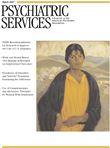Evolving Psychosis: Different Stages, Different Treatments
This volume is the third in a series of titles produced under the auspices of the International Society for the Psychological Treatments of the Schizophrenias and Other Psychoses (ISPS). Two of the editors of this latest production, Jan Johannessen and Johan Cullberg, are the current and past presidents of ISPS, respectively. The other editor, Brian Martindale, is chair of the ISPS network in the United Kingdom and editor of ISPS books. The ISPS group claims a history of over 50 years of pursuing biological explanations for psychosis, but, particularly with this volume, the group is now suggesting that the tide is turning in its direction.
In this book's 16 chapters, the editors have collected the views of some 29 international authorities, based in the United Kingdom, the United States, Canada, Australia, New Zealand, Germany, and Scandinavian countries. These contributors present various nonbiological perspectives on the treatment and understanding of psychotic conditions. I found the sections on early identification and targeted interventions aimed at preventing these conditions to be particularly valuable. The chapters by Patrick McGorry and Jean and Donald Addington focus on stages and phase-specific approaches to treatment of prodromal signs and symptoms and are especially useful. Also, New York-based social workers Susan Miller and Rachel Mason provide very helpful, practical advice regarding various approaches to treatment of first-episode patients, including techniques for maximizing family involvement.
Erik Simonsen's chapter on psychosis and personality gives a particularly helpful, research-based explanation of the relationship between premorbid personality types with high probabilities of developing psychotic conditions. Other chapters of particular interest focus on topics such as the phenomenological prediction and cognitive remediation of schizophrenia and associated syndromes.
Although most of the chapters provide useful or at least interesting information, two of them are little more than thinly veiled polemics arguing for reviving the concept of the schizophrenogenic mother and other such inherently family-blaming concepts that are couched under such adjectival rubrics as "trauma-based" and "post-Lacanian." However, I must admit that even these atypical viewpoints tend to contribute a degree of stimulation to the discourse.
Overall, despite the outlier chapters, this volume provides a very useful collection of views on nonbiological approaches to the understanding, treatment, and possible prevention of schizophrenia and other psychotic disorders. For providers looking for a treatment approach beyond the prescribing and med-checks approach to care, this volume provides a broad spectrum of nonbiological perspectives on caring for members of this vulnerable population.
As a person living with schizophrenia, I think it may have been very helpful if I had been alerted as a youth to the fact that I was a person with a vulnerability for psychosis, before having it come crashing down on me without warning. I also feel that the perspectives on etiology and treatment overviewed in this volume may have value for those of us who are subject to these psychotic conditions.
As the editors announce at the beginning of Psychosis Evolving , with the help of this book, perhaps the tide may well be turning.



